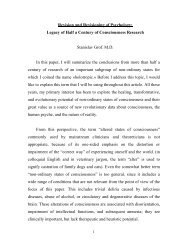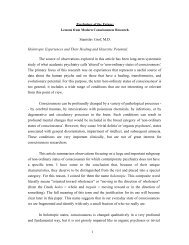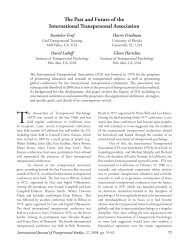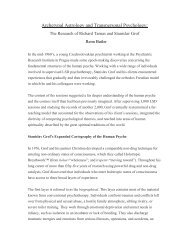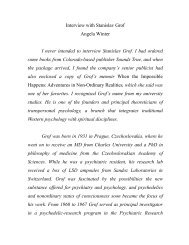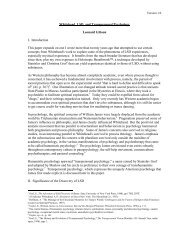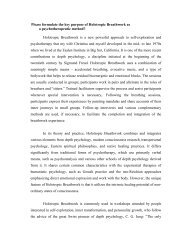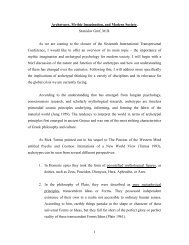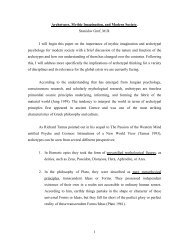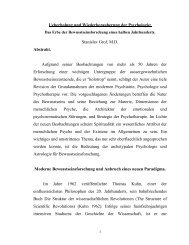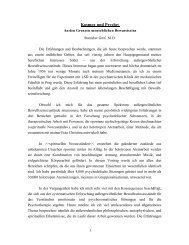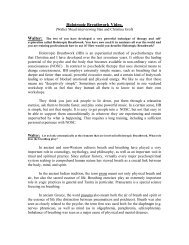1 PSYCHOSIS AND HUMAN SOCIETY: A Historical ... - Stanislav Grof
1 PSYCHOSIS AND HUMAN SOCIETY: A Historical ... - Stanislav Grof
1 PSYCHOSIS AND HUMAN SOCIETY: A Historical ... - Stanislav Grof
You also want an ePaper? Increase the reach of your titles
YUMPU automatically turns print PDFs into web optimized ePapers that Google loves.
The Cartesian-Newtonian thinking dominating Western science that proved to be<br />
extremely effective in physics and had a powerful influence on all the other disciplines,<br />
played a critical role in the development of neuropsychiatry and psychology. The<br />
renaissance of interest in mental disorders in the nineteenth century firmly established<br />
psychiatry as a medical discipline. Rapid advances in anatomy, physiology, pathology,<br />
chemistry, and microbiology resulted in a determined search for organic causes of all<br />
mental disorders in the form of infections, metabolic disturbances, vascular changes, or<br />
degenerative processes in the brain and elsewhere in the body.<br />
This biological orientation in psychiatry was inspired by the discovery of the<br />
causes of several mental disorders that led to effective therapeutic measures. A prime<br />
example of this was general paresis, a condition associated among others with delusions<br />
of grandeur and serious disturbances of memory and intellect. Here the discovery that this<br />
disease was the result of tertiary syphilis of the brain, a disease caused by the protozoon<br />
Spirochete pallidum, was followed by successful treatment combining artificially induced<br />
fever (pyretotherapy) and administration of preparations containing arsenic and mercury.<br />
Similarly, once it became clear that mental disturbances associated with skin problems<br />
and gastrointestinal symptoms (pellagra) were due to deficiency of a certain vitamin of<br />
the B group (vitamin B6 or pyridoxin), it became possible to correct them by an adequate<br />
supply of the missing vitamin. Some other types of mental dysfunctions could be linked<br />
to encephalitis or meningitis, arteriosclerosis, various forms of malnutrition, degenerative<br />
changes in the brain, and cerebral tumors.<br />
These initial successes spurred enthusiastic search for biological causes of other<br />
mental disorders, particularly psychoses. The scientists pursuing this avenue of research<br />
were convinced that psychotic states represented such a drastic distortion of "objective<br />
reality" that one had to assume some serious damage to the organs involved in the<br />
perception and testing of reality, particularly the central nervous system. This conviction<br />
was the moving force behind countless studies looking for specific causes of psychoses,<br />
such as genetic factors, constitutional dispositions, anatomical and neuropathological<br />
anomalies, endocrine disturbances, autoimmune reactions, viral and bacterial infections,<br />
and biochemical deviations.<br />
Many hypotheses have been formulated and tested over the years, but the results<br />
have been generally inconclusive and disappointing. Except the increased incidence of<br />
13



